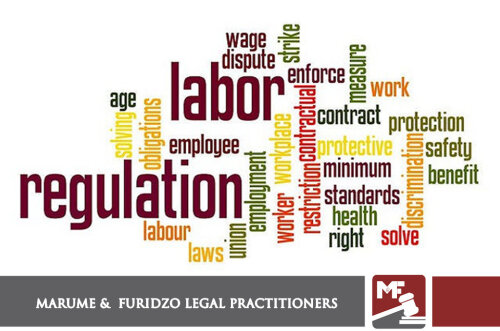Best Labor Law Lawyers in Harare
Share your needs with us, get contacted by law firms.
Free. Takes 2 min.
List of the best lawyers in Harare, Zimbabwe
About Labor Law in Harare, Zimbabwe
Labor Law in Harare, Zimbabwe, is governed by a framework designed to protect the rights of both employers and employees. The primary legislation in this regard is the Labour Act [Chapter 28:01], which addresses various aspects such as employment terms, working conditions, dispute resolution, and workers' rights. This legislation aims to promote fair labor practices and ensure that employees are treated justly. Understanding the intricacies of labor law is crucial for both employees and employers to maintain compliance and prevent disputes.
Why You May Need a Lawyer
There are several situations in which individuals may require legal assistance in Labor Law. These include:
- Unfair dismissal or wrongful termination cases
- Negotiating employment contracts or severance packages
- Discrimination or harassment at the workplace
- Disputes over wages and working hours
- Occupational safety and health violations
- Grievance procedures and collective bargaining issues
A lawyer with expertise in labor law can provide valuable guidance and representation in these situations, helping to safeguard your rights and achieve a favorable outcome.
Local Laws Overview
The Labour Act in Zimbabwe lays down several key legal requirements and provisions:
- Employment Contracts: Employers are required to provide written contracts to employees, clearly outlining the terms and conditions of employment.
- Termination and Dismissal: The Act specifies the grounds for lawful termination and requires proper procedures for dismissal to prevent unfair practices.
- Working Conditions: Employers must ensure safe working conditions, and there are specific laws regarding working hours and overtime compensation.
- Employee Rights: Employees are protected against discrimination and harassment, both during recruitment and in the course of employment.
- Dispute Resolution: The Labour Act provides mechanisms for addressing labor disputes, including the Labour Court and arbitration processes.
Frequently Asked Questions
What is the maximum probation period for a new employee?
In Zimbabwe, the maximum probation period is usually three months but can vary depending on the industry and the agreement between the employer and employee.
Can an employer change an employment contract unilaterally?
No, any changes to an employment contract must be mutually agreed upon by both the employer and employee.
What constitutes unfair dismissal?
Unfair dismissal may occur if an employee is terminated without just cause or if proper procedures, as outlined in the Labour Act, are not followed.
How can I resolve a dispute with my employer?
Initially, disputes may be resolved through internal grievance procedures. If unresolved, mediation or arbitration through the Labour Court may be necessary.
Are employees entitled to maternity or paternity leave?
Yes, female employees are entitled to maternity leave without loss of pay, seniority, or benefits, as per the Labour Act. Paternity leave policies are generally at the discretion of the employer.
What should I do if I experience workplace harassment?
Report the incident to your employer, as most organizations have policies and procedures to handle harassment. If unresolved, legal counsel or labor unions can provide assistance.
How are wages regulated in Zimbabwe?
Wages are typically determined by sector-specific statutory instruments or through collective bargaining agreements. Employers must comply with the minimum wage laws applicable to their industry.
Is it legal to go on strike in Zimbabwe?
Yes, employees have the right to strike, provided they follow the legal procedures outlined in the Labour Act, including giving notice and seeking mediation first.
Can an employer refuse leave requests?
Employers can regulate leave through company policy, but they must comply with statutory leave entitlements and provide valid reasons if a request is denied.
How can unions assist in labor disputes?
Unions can offer support by negotiating on behalf of employees, representing workers in disputes, and advocating for fair labor practices.
Additional Resources
If you're seeking legal advice or support regarding labor law in Harare, Zimbabwe, consider these resources:
- Ministry of Labour and Social Welfare: The government body responsible for implementing labor policies and regulations.
- Zimbabwe Congress of Trade Unions (ZCTU): A national organization representing workers and providing assistance with labor issues.
- The Labour Court: Handles labor disputes and provides legal resolutions for employment-related conflicts.
- Law Firms Specializing in Labor Law: Many legal firms in Harare focus on labor law and can offer specialized legal advice.
Next Steps
If you find yourself needing legal assistance in Labor Law, here are the steps to follow:
- Identify Your Issue: Clearly understand your employment-related concern or dispute.
- Gather Documentation: Collect any relevant documentation, such as employment contracts, emails, company policies, and any correspondence related to your issue.
- Consult with a Lawyer: Seek advice from a lawyer specialized in labor law to discuss your situation and explore potential legal actions.
- Contact Relevant Resources: Reach out to trade unions, governmental bodies, or other organizations for additional support or mediation services.
- Proceed with Legal Action: If necessary, your lawyer can represent you in negotiations, mediation, or court proceedings to seek resolution.
By taking these steps, you can protect your rights and work towards resolving your labor law issues in Harare, Zimbabwe.
Lawzana helps you find the best lawyers and law firms in Harare through a curated and pre-screened list of qualified legal professionals. Our platform offers rankings and detailed profiles of attorneys and law firms, allowing you to compare based on practice areas, including Labor Law, experience, and client feedback.
Each profile includes a description of the firm's areas of practice, client reviews, team members and partners, year of establishment, spoken languages, office locations, contact information, social media presence, and any published articles or resources. Most firms on our platform speak English and are experienced in both local and international legal matters.
Get a quote from top-rated law firms in Harare, Zimbabwe — quickly, securely, and without unnecessary hassle.
Disclaimer:
The information provided on this page is for general informational purposes only and does not constitute legal advice. While we strive to ensure the accuracy and relevance of the content, legal information may change over time, and interpretations of the law can vary. You should always consult with a qualified legal professional for advice specific to your situation.
We disclaim all liability for actions taken or not taken based on the content of this page. If you believe any information is incorrect or outdated, please contact us, and we will review and update it where appropriate.















